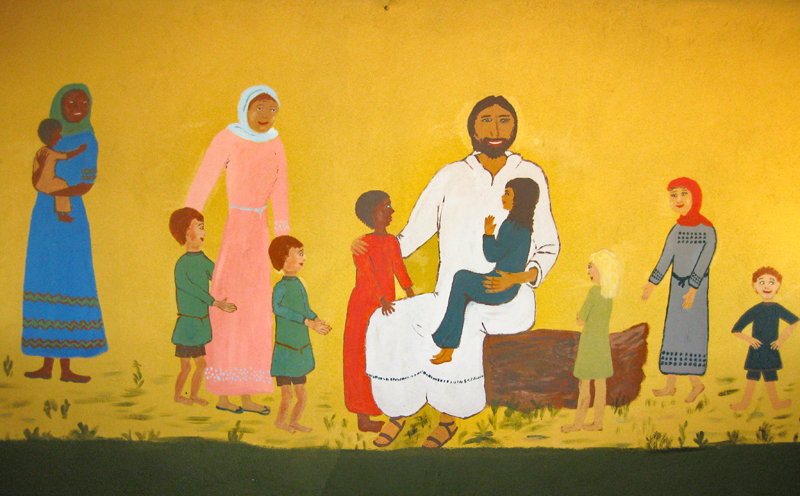Revised Common Lectionary Reflection, Fourth Sunday of Easter, Year A
May 3, 2020
Lessons: Acts 2:42-47; Psalm 23; 1 Peter 2:19-25; John 10:1-10
Theme: God’s faithful and generous people recognize their need for real life and a real deal Messiah. They find both in the Christ.
Key Scripture: For you were going astray like sheep, but now you have returned to the shepherd and guardian of your souls. -1 Peter 2:25

Most of us have encountered Maslow’s Hierarchy of Needs. Published in 1943 in Psychological Review, Maslow’s theory is represented as a pyramid, with basic physiological needs forming the bottom (food and water, shelter, sleep, clothes, health, and homeostasis), followed by the need for safety and security, human connection and social belonging, self-esteem, and self-actualization. Maslow later added transcendence to the list, supplanting self-actualization with the desire to touch the infinite.
Maslow’s work has been the subject of much debate and criticism. Neuroscientist Nicole Gravagna offers an updated list based upon developments over the last 75 years in psychology, neuroscience, and sociology. Her list includes food, water, shelter, sleep, others, and novelty. The assumption is that if these six needs are met regularly, then folks will have enough motivation, energy, and well-being to take care of themselves. Of course, this is not always the case. Life is not perfect, and neither are humans.
“Unfortunately, when people go for a long time without having all six of these needs met, it becomes difficult for them to begin to allow for these needs to be met,” says Gravagna. “A person who doesn’t get enough sleep will insist that they can do without. A person who has grown up without deep connection to others will insist that they prefer to live as a loner. Those who have deeply rutted routines will resist change when it is offered to them.”

We fall back into protective patterns, believe we are special and can push the envelope repeatedly, and float down that river known as denial. All the while, our need is still there, as is our deep desire to stand before someone else, naked in our vulnerability, with our life’s warts and failings in plain view, and still be loved exactly as we are. We want to live our best life, but we settle for something less in order to protect our fragile egos and feelings of unworthiness.
Father Richard Rohr, in his book Falling Upward: A Spirituality for the Two Halves of Life, reminds us that we spend the first half of our life figuring things out, self-differentiating, accumulating, and striving to achieve. And then, not surprisingly, most of us turn around and ask, “Is this all there is?” We then spend the last half of our life deconstructing our carefully curated selves in a quest to embrace who we truly are meant to be. Or, as Carl Jung said, “The privilege of a lifetime is to become who you truly are.”
This Sunday is known as Good Shepherd Sunday, and wow, do we need the real deal Shepherd right now! Whether you look at Maslow’s hierarchy or Gravagna’s updated list of needs, it’s pretty clear that a lot of folks aren’t having their basic needs met right now. People who are sheltering alone in place are longing for human connection and touch. Many are hungry, have lost jobs, or are unsure whether they’ll have a roof over their heads in months to come. Friends, we’re going to see the fallout from our current world situation for a long time, and it will be scary. But, we have this amazing opportunity to emerge from this crisis to become who we truly are and all that we are meant to be.

Of course, Jesus has been there all along. He’s been suffering with medical personnel making excruciating decisions about patient care. He’s been with the sick, the dying, and the grieving. He’s with and among the church dispersed. There is nowhere that Jesus is not, yet whether we see the Christ at work in the world depends largely on the lens through which we view life. If we’re looking through lenses of greed, control, power, or even inconvenience, we may not have many Jesus sightings. If we’re rushing to get back to life as usual, we may miss some beautiful moments. Yes, this situation is serious, and there’s still a lot of suffering, inconvenience, and hardship on the horizon, but Jesus, the true shepherd, is with and alongside us, always aiming us toward real life. This good news gives us hope and challenge. We have hope in a better way that leads to abundant life for all, and we are challenged to roll up our sleeves, drop our pretenses, and make that hope happen through the love of Christ.
Ponder this: Are we are ready to follow Jesus, the real deal Messiah, the true Good Shepherd, into a radically new way of being? Or, will we settle once again for the false comfort of our own limited constructions?
In Worship
How about a tag psalm this week? Invite members of your congregation to video themselves reading a half verse of the 23rd psalm. Piece the recordings together for a visual reminder of the Body of Christ we call home.
With
Youth
Continue to check in with youth for a regular group chat, prayer, and
encouragement. This week you might have them consider how we know that Jesus is
the “real” or “true” shepherd. What distinguishes him from false shepherds? Who
or what might constitute the false shepherds of our day?
With Children
This week’s focus verses are Acts 2:46-47: Day by day, as they spent much time together in the temple, they broke bread at home and ate their food with glad and generous hearts, praising God and having the goodwill of all the people. And day by day the Lord added to their number those who were being saved.
Wow! I don’t about you all, but there’s been a little bit of cabin fever around our place. Don’t get me wrong. We all love one another a lot, but we’re not used to all being in the same small space every hour of every day. Sometimes we get on one another’s last nerve, complete with stomping and loud, angry words. And then we all feel bad and agree to do better. Thankfully, because of Jesus, we are learning about grace. We know that grace is ours because of Jesus, but sometimes we’re not too good at extending grace to others.
Then I read this week’s lesson from Acts about how that early Christian community lived and worked together, and it reminds me that we can do better as a family. We just need to remember how the early church family acted, and try our best to be more like them.
Do you think we can do it? Do you think we can all try to be a little more patient, a little kinder, a little more forgiving, a whole lot more loving, and remember to have some joy in every day. But the most important thing we need to do is pray.
Finish with a simple echo prayer and blessing.
Dear God (Dear God),
Thank you for loving us (thank you for loving us). Thank you for Jesus, our real shepherd (Thank you for Jesus, our real shepherd). Help us to be more like the first church (Help us to be more like the first church), sharing and caring (sharing and caring), helping and loving (helping and loving), and giving and praising (and giving and praising). Keep us from fear (Keep us from fear). Keep us hopeful (Keep us hopeful). Make us helpful (Make us helpful). Give us peace (Give us peace). Amen (Amen).
Weekly
Stewardship Bulletin Insert
News reports assault and alarm us with an uncertain future
ahead. It’s easy to let fear get the upper hand. Breathe deeply and remember
that Christ is with us and will see us through whatever lies ahead. Our job is
to continue to be faithful followers to the best of our ability. Thank you,
faithful church, for keeping ministry going in these uncertain days.
Stewardship
at Home
How are you faring, Body of Christ? Are you lonely and
missing the companionship of friends? Are you exhausted from working, helping
with school, and trying to keep groceries in the house? Are you afraid? Angry?
A little bit of everything?
Take inventory of your present situation. Take some time to lament what has been lost during these last few weeks and what has been hard. Then take some time to give thanks for an equal number of people, places, or things for which you’ve been grateful this week. Consider writing out or drawing your feelings and then take it all to God in prayer. Know that the true shepherd is with you, hears your prayers, and will make a way.
After you’ve completed this prayer exercise (adapt to work with children as needed), remember that others in your faith community are feeling some of the same things. Choose another person or family to send a card of encouragement to and commit to pray for them for the next week. The more ways we can make connections during this time, the better!
2017 Reflection: https://www.stewardshipoflife.org/2017/05/day-by-day-with-glad-and-generous-hearts/
2014 Reflection: https://www.stewardshipoflife.org/2014/05/stewards-of-the-promise-part-one/
2011 Reflection: https://www.stewardshipoflife.org/2011/05/%e2%80%a6with-glad-and-generous-hearts/
Images: Le Breton, Jacques ; Gaudin, Jean. Jesus the Good Shepherd, from Art in the Christian Tradition, a project of the Vanderbilt Divinity Library, Nashville, TN.; Jesus Welcomes All, from Art in the Christian Tradition, a project of the Vanderbilt Divinity Library, Nashville, TN.; Elvert Barnes, Creative Commons.
Note: Reprint rights granted to congregations and other church organizations for local, nonprofit use. Just include this note: “Copyright (c) 2020, Rev. Sharron Blezard. Used by Permission.” Other uses, please inquire: thewritelife@hotmail.com.



Leave a Reply